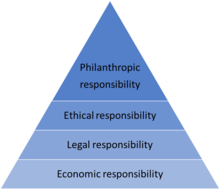Corporate social responsibility (CSR) refers to the voluntary actions that businesses can take to operate in an ethical and sustainable manner and to contribute to economic development while also taking into account the social and environmental impacts of their operations. CSR initiatives can include a wide range of activities such as supporting local communities, reducing greenhouse gas emissions, promoting diversity and inclusion, and more.
However, despite the positive intentions of CSR, it has also been the subject of criticism. One common criticism is that CSR is primarily a PR tactic used by businesses to improve their reputation and image rather than a genuine commitment to social and environmental responsibility. This view is supported by the fact that some companies engage in CSR activities primarily for the purpose of improving their reputation or to distract from negative actions or practices.
Another criticism of CSR is that it is often used as a substitute for government regulation. Some argue that businesses should not be responsible for addressing social and environmental issues and that it is the role of governments to regulate and address these issues through laws and policies. This view suggests that CSR is a way for businesses to avoid government regulation and to present themselves as socially responsible without actually making any significant changes to their operations.
Additionally, some critics argue that CSR initiatives are often superficial and do not address the root causes of social and environmental problems. For example, a company may donate money to a charity or plant a few trees, but these actions do not address the underlying issues that lead to social and environmental problems in the first place. This criticism suggests that CSR initiatives are often inadequate and do not go far enough in addressing the complex and systemic issues that society faces.
Finally, there is the criticism that CSR often benefits the company more than it benefits society. For example, a company may invest in renewable energy projects as part of their CSR initiatives, but this investment may also result in cost savings for the company due to lower energy costs. This means that the company is able to improve its bottom line while also presenting itself as socially responsible.
In conclusion, while CSR can be a powerful tool for businesses to operate in a more ethical and sustainable manner and to contribute to economic development, it is not without its criticisms. Some argue that it is primarily a PR tactic, a substitute for government regulation, superficial, or that it benefits the company more than it benefits society. It is important for businesses to be aware of these criticisms and to ensure that their CSR initiatives are genuine and address the root causes of social and environmental problems.






